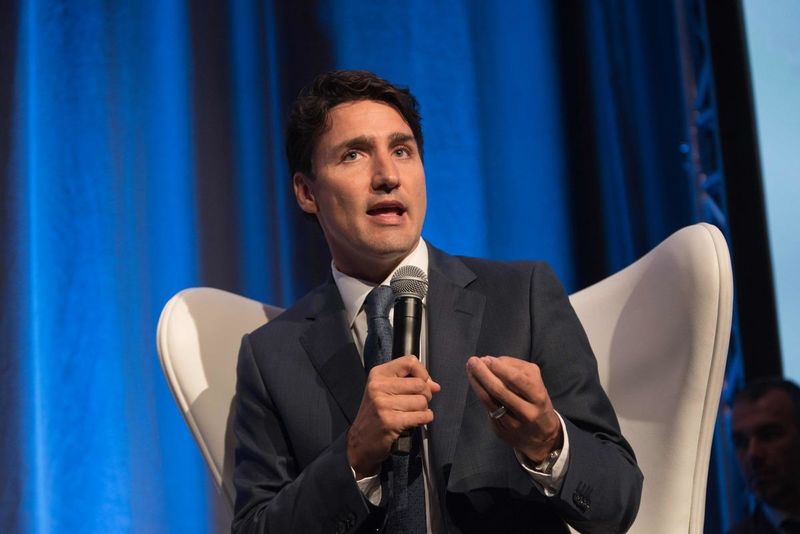The federal government has long insisted the Trans Mountain pipeline expansion will be built. Now it has to match its good intentions with results. At stake is nothing less than the fate of the Canadian federation.
The refusal of the government of British Columbia to recognize the legal approval process for the project means this test is about much more than a pipeline — it’s about the ability of the federal government to regulate the economy of Canada in the national interest.
Failure would mean we might as well Balkanize the country into a scattering of provincial fragments.
Kinder Morgan, the proponent of the expansion to a pipeline carrying Alberta bitumen from the oilsands to an export terminal near Vancouver, said Sunday it is suspending activity on the pipeline until May 31. The news was delivered to Justin Trudeau on Saturday evening, just as he was planning to head to a vigil in Saskatchewan for the victims of the Humboldt Broncos bus crash. The insensitivity of the timing was a reminder that this is a foreign multinational, motivated solely by maximizing returns to its shareholders.
Kinder Morgan’s demand for political certainty, in the face of various legal attempts by B.C.’s NDP government to block the project, is logical. The company is about to ramp up spending on the expansion, moving from clearing trees to laying pipe. It is not prepared to start that work until Premier John Horgan’s government backs down and, crucially, the legal approvals already won in court are enforced on the ground.
The City of Burnaby said late last month it will not pay RCMP overtime costs related to Trans Mountain because its citizens oppose the project. About 200 people have been arrested near the Burnaby marine terminal in the last month. The company’s concerns are, no doubt, sincere.
But it is likely there is also a degree of opportunism at play — the sense that the company can scoop up some of the free public money that now appears to be on the table.
No sooner had the news broken on Sunday than Alberta Premier Rachel Notley said her province might seek an equity stake in the expansion to re-assure Kinder Morgan shareholders. Curiously, Opposition leader Jason Kenney agreed with her that the province should write a blank cheque to make a political problem go away.
A public sector injection of funds may well end up being part of the solution — it is certain to be on the agenda at the next federal Cabinet meeting on Tuesday. But it’s understood that to this point Kinder Morgan has resisted the suggestion of an equity investment, preferring to have the provincial and federal governments underwrite the project by providing risk insurance — essentially leaving the governments on the hook if the company ultimately decides to walk away completely.
Ottawa has options to persuade Horgan to back off, but none of them is infallible.
The federal government sends $6.9 billion to Victoria every year in health and social transfers. Trudeau could bring down that clunking fiscal fist on Horgan’s head. The premier is naïve in the extreme if he thinks he can thumb his nose at the rest of the country without consequence, just to ensure the continued support of the three Green MLAs propping up his wobbly government. B.C. might be, as former Province columnist Eric Nicol put it, a large land mass surrounded on three sides by envy but it is still connected economically to the rest of Canada.
Yet there are risks in raising the temperature, as Notley did when she warned British Columbians they “cannot mess with Alberta.”
Polling shows Trans Mountain enjoys more support than opposition among British Columbians, and the federal government is keen to keep it that way. If Ottawa is deemed to be acting unfairly, it would allow Horgan to wrap himself in B.C.’s setting-sun flag.
“If Horgan is seen as a champion of B.C. against Alberta and Ottawa, he has a chance,” said one senior official.
The preferred option on the federal side is to portray the rookie premier as an “economic vandal.”
The feds could try to assert their constitutional preeminence by referring the case to the Supreme Court but to do so might suggest they have concerns their case is not solid — something nobody to this point has seriously disputed. The legal consensus is that the B.C. government cannot impair a federally-regulated undertaking.
But legal niceties and politics are two different beasts, and it is unlikely that any kind of legal progress could be made on Kinder Morgan’s timeline.
Trudeau and his ministers are keeping their preferred option close to their chests, but in Montreal on Monday, the Prime Minister was as combative as he gets outside the boxing ring.
“It is not up to the premier of B.C. to interfere in a project in the national interest,” he said. “It will get built.”Such optimism appears at odds with the available facts. But maybe he knows something we don’t.
There are whispers that if Kinder Morgan were to walk away, the Trans Mountain pipeline (and the regulatory approval for the expansion) might be bought by Canadian investors, in the same way that domestic players like Canadian Natural Resources and Suncor stepped up to buy assets divested by multinationals like Shell.
Whatever levers the Prime Minister intends to pull, his confidence had best not be misplaced. The Liberals’ grand bargain to introduce carbon pricing and build pipelines was sound in theory. But the carbon tax is facing growing opposition in provincial capitals and now the pipeline in in jeopardy.
If Trudeau fails to get it built, it will be the biggest blow to his credibility since he took office.
In the past, Trudeau has let himself down, which is his prerogative. But if Trans Mountain is blocked, he will have let his country down. That will not be allowed to stand.


























